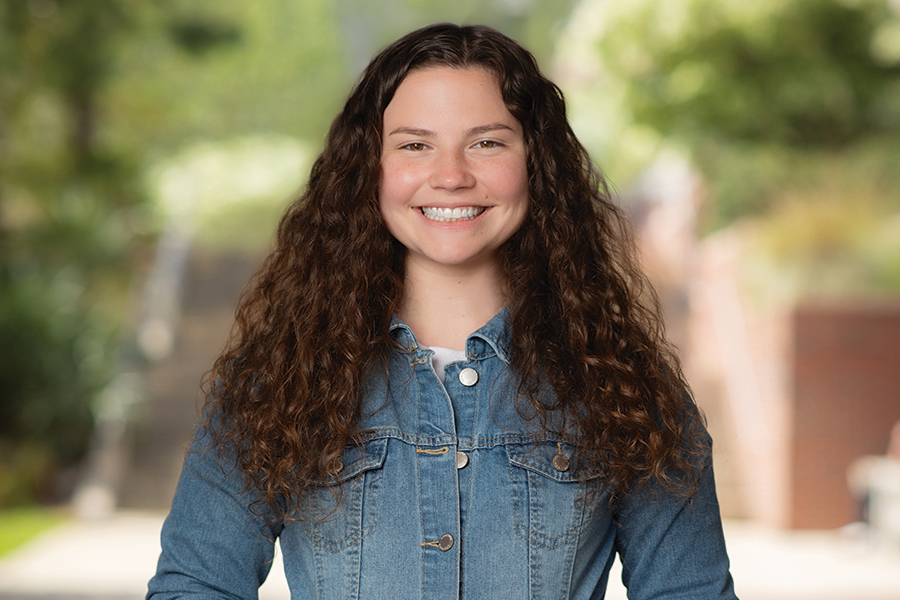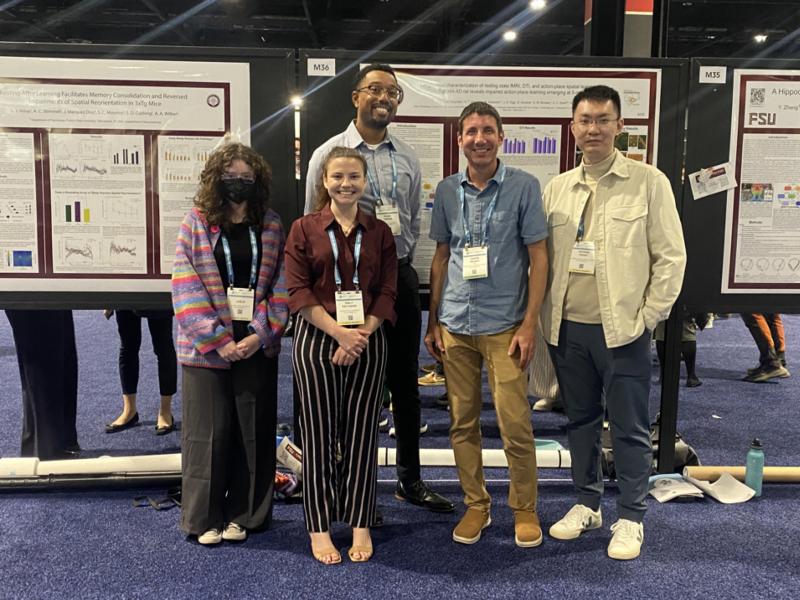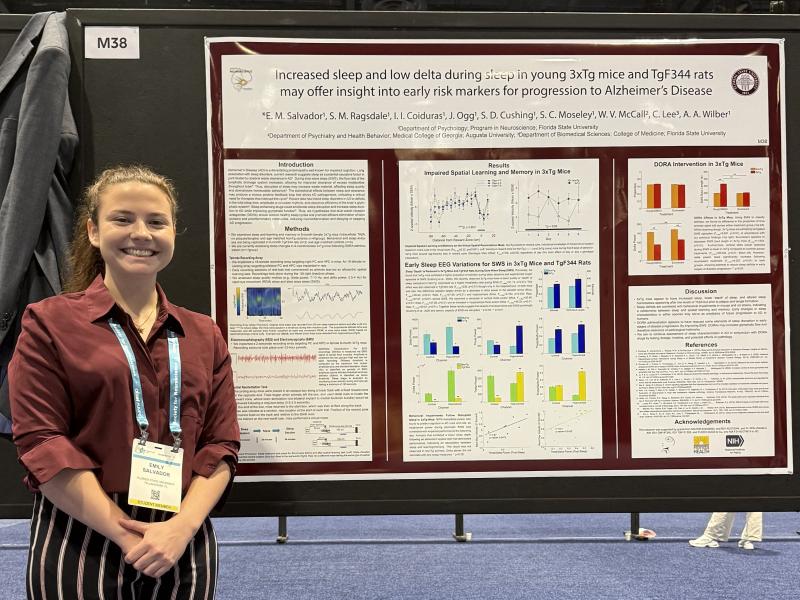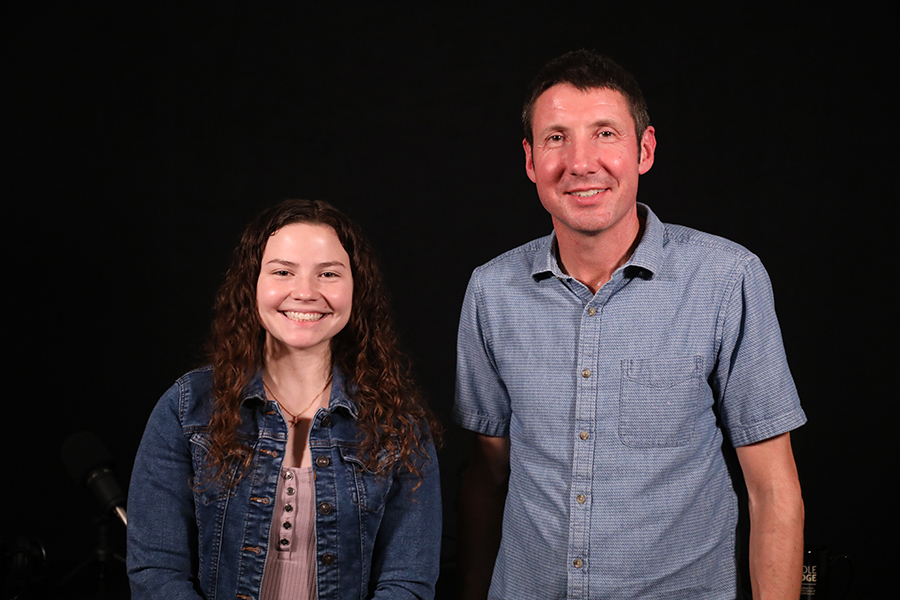Root Causes
Neuroscience doctoral student Emily Salvador investigates origins of Alzheimer’s disease

While you’re fast asleep, your brain prepares to start the next morning fresh by taking its trashcan to the curb. Well, several trashcans. Approximately 86 billion trashcans, actually — one for each neuron in the brain.
The lymphatic system clears waste from the entire human body with the exception of the brain, an area where new research suggests it gets an assist from non-neuron cells called glia. Emily Salvador, a second-year doctoral student in Florida State University’s Program in Neuroscience, studies how disruptions in the brain’s waste-management process may impair neurological function in the context of Alzheimer’s disease, a progressive form of dementia affecting one in 13 people ages 65 to 84, according to the National Institute on Aging.
“I study Alzheimer’s not only because it’s fascinating on a scientific level but because it’s such a detrimental disease,” said Salvador, who earned her bachelor’s degree in cell and molecular neuroscience from FSU’s Department of Biological Science in 2023. “Although medicine can treat some Alzheimer’s symptoms to a limited extent, current medical practices can’t cure patients — not without research.”
One of Salvador’s current research projects explores how poor sleep quality may weaken the glymphatic system — the joint effort by glia and the lymphatic system to flush waste from the brain. Suppressed glymphatic functioning can result in a buildup of neurotoxins and a sticky, protein-based substance called plaque, which initially weakens communication among the brain’s neurons and eventually kills them. Salvador investigates this phenomenon as a potential root cause for those who have both Alzheimer’s and sleep problems, a combination representing a large segment of Alzheimer’s patients.
“My work seeks to understand one of the earliest behavioral changes caused by Alzheimer’s — impaired spatial navigation and spatial memory, or how we orient ourselves in space to navigate our environment — and how routine, quality sleep may improve memory impairments we see in Alzheimer’s by flushing out neurotoxins that build up daily,” she said.
This research is based in the Wilber Lab, which is led by Salvador’s doctoral mentor and associate professor of psychology Aaron Wilber. More broadly, the Wilber Lab investigates spatial navigation and spatial memory, a process that engages memory among other cognitions, and how this ability can become impaired by Alzheimer’s.
“Science is an incredible thing to be a part of, and it takes time and collaborations that are sometimes invisible to the non-scientific community,” Salvador said. “People want fast results, but that’s not exactly how science works. Science is a puzzle, and every single neuroscientist is working together on the same puzzle — the human body.”
Salvador’s research journey began as an undergraduate in former associate professor of psychology Alexandria Meyer’s lab, which specialized in clinical child psychology research. Following this experience, Salvador examined how different regions within the brain communicate to execute tasks — part of a research assistantship with the Nee Lab, led by associate professor of psychology Derek Nee, which investigates working memory and cognitive control.
She first studied Alzheimer’s through a neurobiological lens during a summer internship in Israel in 2022 under Uri Ashery, a professor of neuroscience at Tel Aviv University. The following fall, Salvador applied to conduct her doctoral research alongside Wilber, as his lab combines Salvador’s longstanding interest in sleep research and her newly discovered interest in Alzheimer’s.
“Emily is particularly talented in computationally demanding data analyses, and she’s developed an expertise in the relationship among sleep, Alzheimer’s and the glymphatic system,” Wilber said. “Emily’s passion for research and her willingness to engage with anyone who will listen is especially important for conveying the necessity of her work, and science more broadly, to the public.”
Upon her acceptance to FSU as a graduate student, Salvador earned a highly selective Neuroscience Fellowship, which covers tuition for up to two years. Each year, only two or three neuroscience doctoral students are chosen to receive this fellowship.
“In undergrad, one of my professors said, ‘Medicine treats symptoms, but research finds root causes,’ and that stuck with me,” Salvador said. “Alzheimer’s is the most common form of dementia, and it’s devastating for both patients and their families. Maybe the disease won’t be cured in my lifetime, but my work will move cogs in the machine forward to help people — not just in the U.S. but also across the globe.”
Kendall Cooper is a two-time FSU alumna who earned a master's degree in media and communication studies with a certification in project management in 2025 and a bachelor’s degree in media and communication studies with a double major in editing, writing and media in 2023.




